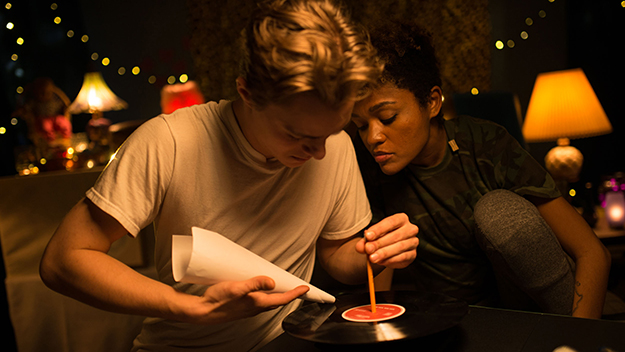Film of the Week: Give Me Liberty

Images from Give Me Liberty (Kirill Mikhanovsky, 2019)
Kirill Mikhanovsky’s Give Me Liberty is relentless and altogether exhausting—but it’s also a joyous, tender blast, and was rightly one of the hits of this year’s Cannes, where it featured in Directors’ Fortnight after premiering in Sundance. It now plays as the centerpiece of BAMcinemaFest on Monday, June 17, before its release later this year.
Variety’s review in Sundance compared the film in part to the Safdie Brothers’ Good Time, and while you’re likely to have more of an unalloyed good time with Mikhanovsky than with the Safdies’ exhilarating but often discomforting drama, the comparison holds. Like their film, Give Me Liberty kicks in with a whomp and never lets up, apart from the odd moment when it briefly seems to lean back and fill its lungs before the next plunge into mayhem. It has all the exuberance of a youthful debut, although it isn’t one: Mikhanovsky’s first film, the Brazilian-set Sonhos de Peixe, played in Cannes Critics’ Week back in 2006. But his follow-up Give Me Liberty has an autobiographical directness: based on a job that the director once had when he first came to the US, it also has the vivid agitation you might associate with an expatriate Russian community still adjusting to a new environment, while sustaining some of the habits and attitudes of the old country. It is very Russian in its manic humour, turning Milwaukee, of all places, into a milieu as imbued with chaos as the East seen in Alexei German’s or Sergei Loznitsa’s films (or indeed, if you’ll excuse the geographical drift, Emir Kusturica’s). It is also, however, very American in its mixing of cultures, communities, and energies.
The film’s protagonist is Vic, played by Chris Galust—like most of the film’s cast, a newcomer to the screen. Resembling a glum young Leonardo DiCaprio who hasn’t eaten or slept for days, Vic is a young Russian-American who works driving a van that transports local disabled people around various centers in his run-down part of Milwaukee. He’s also a solicitous ally and general helper to family and neighbors—among them, a quadriplegic man (James Watson) who appears throughout the film dispensing sage, sometimes wiseacre, wisdom. Despite his severe disability, he tells Vic, “Life is what it is… Life is wonderful. I love everything about life—even the dust, the rats, the chickens. Love conquers all.”
Chickens prove to be one of Vic’s problems. His demented Dyed, or grandfather (Arkady Basin), is obsessed with cooking them any way he can, which proves a problem for anyone who’s around: one of his preparation techniques involves smashing the bird, and the plate underneath, with a dumbbell. It’s just one of the many challenges defining Vic’s working day, which the film maps from beginning to end, and which includes transporting blind, overweight and phenomenally cantankerous client Nate (Ben Derfel), who could kvetch in the Olympics—“Do you hear me complain! No!”—and who has an especial, irrational animus against Elvis Presley.
On this particular day, it so happens that an elderly Russian woman named Lilya has just died, and Grandpa and a group of her friends and relatives imperiously insist on Vic giving them all a lift to her funeral. Off they all go crammed into his van, stopping to pick up Tracy (Lauren ‘Lolo’ Spencer, giving a winningly brash, no-nonsense performance), a young African-American wheelchair user, who spends the trip in furious disbelief at having to share her scheduled ride with this riotous crowd and their accordion. Also along for the journey, and relishing every moment, is Dima, a young Russian boxer from the Bronx, who appears to be Lilya’s nephew, but who’s essentially there to make the trip more chaotic for everyone. A pugnacious innocent who’s up for anything, he’s inclined to genially, genuinely fall for every woman he sees, including Vic’s sister (Darya Ekamasova), with whom he sparks over a jar of pickled cabbage. Dima is played by Maxim Stoyanov, who resembles a muscle-bound young James Gandolfini, has the eagerness of a large Alsatian puppy, and exudes the sort of undiluted force-of-nature comic charisma that filmmakers pray will miraculously fall out of the sky and into their cast.

Vic’s day turns into one damn thing after another, in a series of complex manoeuvres that make getting from A to B, and then with any luck C, a nerve-rackingly screwball process. If one person has to get off the bus, the others have to be cleared out first, and are then likely to wander off and need herding back; if Vic has to stop at a house, you can bet that there will be a mattress blocking a doorway that requires several people to move it. Throughout all this, Vic manages to keep a cool head—probably necessary since he’s obliged to drive at a maniac’s pace throughout, negotiating roadblocks and other unexpected detours (“What Russian doesn’t like fast driving?” cheers Dima). The running joke throughout is Vic’s insistence—as he takes ever more aggrieved calls from his supervisor—that the rest of his journey will take “ten minutes tops.”
The film wanders from one episode to another: from Lilya’s funeral, where the crowd bickers over which language to sing in, to a boozy wake where Dima smooth-talks an imperturbable female superintendent into letting the whole crowd into Lilya’s apartment, an EDM disco at a training center for the disabled, and so on, and so on… Eventually, the action appears to burn itself out and quieter interludes happen—without much obvious narrative motivation, but by way of letting the characters, and the viewers, and the film itself take a necessary deep breath. One such moment is a stop-off with Tracy’s African-American family, and an exchange of views with her kid brother, whose activities as a budding rapper no-one much approves of: this section seems a good-natured non-sequitur, although it unexpectedly pays off in a thunderous denouement.
Give Me Liberty seems wildly scattershot, although that’s presumably part of its design, written into the script by Mikhanovsky and his co-writer and producer, playwright Alice Austen. The sense of chaos is also inscribed in Mikhanovsky’s own frenetic, staccato editing, sometimes punctuated by incongruous little achronological hiccups—like an out-of-nowhere insert of a man seen earlier manipulating thread at the center. Add to this the way that Wyatt Garfield’s handheld photography will sometimes flare and crackle, or mysteriously oscillate between color and black and white, and the film has a crazily organic, quasi-experimental tone that’s entirely its own.
Disability isn’t strictly its main theme, but the film deals with the subject more boisterously and irreverently than anything I’ve seen since a pugnacious, now largely forgotten French comedy called Nationale 7, aka Uneasy Riders (Jean-Pierre Sinapi, 2000). The way it drifts and swerves to take in everything and everyone that comes its way is as generous and fluid as Vic’s itinerary, and there’s no-one here—even dyspeptic Nate—who isn’t enjoyable company. Galust as Vic gives the most restrained performance here, as a young man who’s holding it all in for fear of losing it completely.
Amid its unruly surges of energy, this is an expansive film that also takes in such charming incidentals as a curious trick that Vic shows Tracy, involving a needle, a cone of paper, and a vinyl LP; and the gallery of vividly coloured felt pen drawings of trees, created by Gregory Merzlak (one of the cast), which ends the film on a note of beatific charm to the sound of Bon Iver. It’s also a film that, for all its frenzy, is relaxed enough to stop now and then and take an interest in characters like Tracy’s mother (Sheryl Sims-Daniels), very affecting as she cries remembering her late husband. Mikhanovsky gives the time of day to people who, even if tenuously related to the main action, briefly get to step—or roll—into the limelight and do their thing in a film that’s entrancingly generous and democratic.
Jonathan Romney is a contributing editor to Film Comment and writes its Film of the Week column. He is a member of the London Film Critics Circle.







